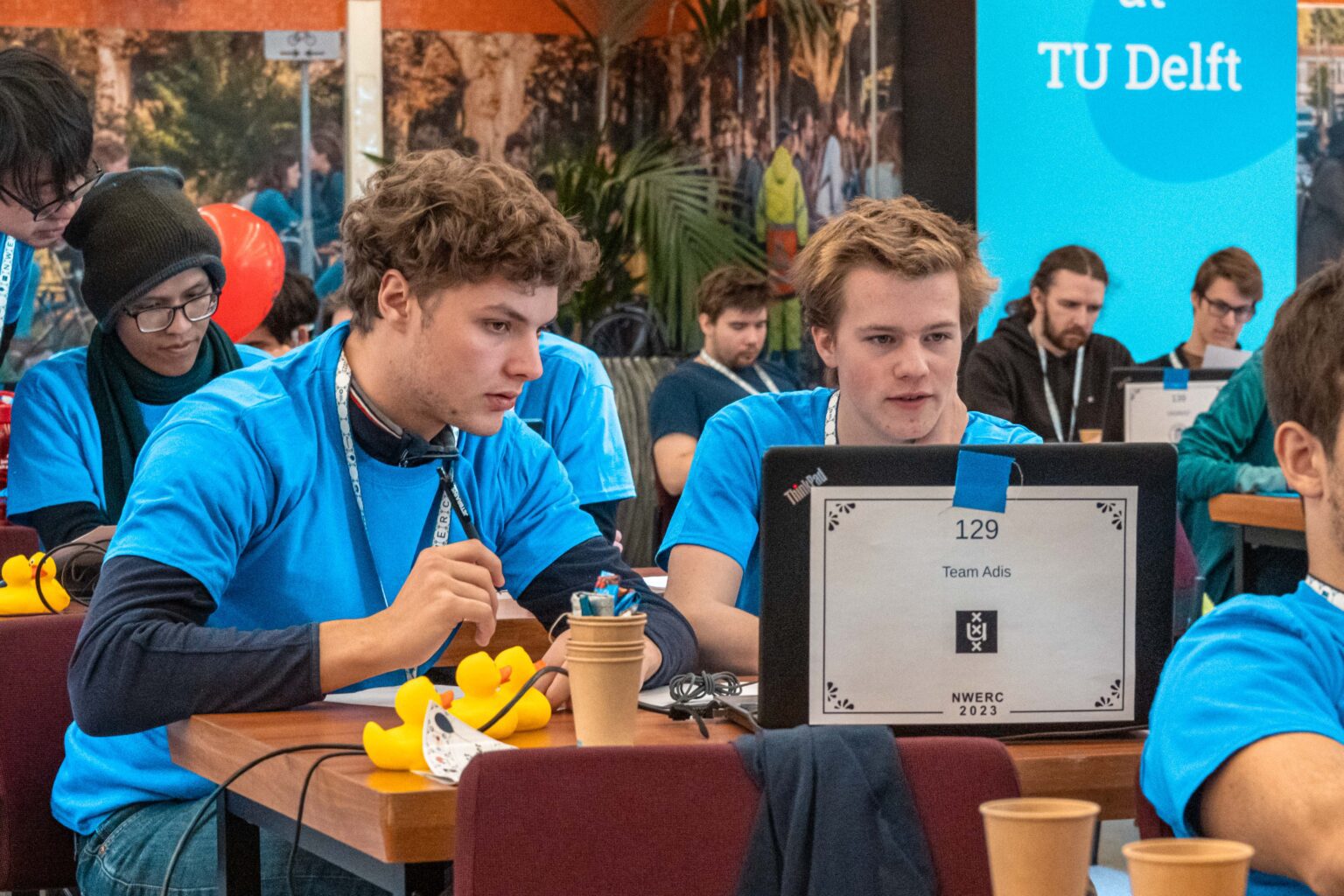On the weekend of 25 and 26 November, the Aula hosted the largest programming competition in Northwest Europe, organised by the Christiaan Huygens study association.
The 150 teams consist of three students with one laptop. (Photo: Thijs van Reeuwijk)
Everything can be described in superlatives: 450 students selected from 13 European countries lying between the Benelux, Finland and Iceland worked in all the rooms around the auditorium. During the finals on Sunday, the students worked in teams of three for five hours, hyper-concentrating on the 12 assignments put together by the jury. In the auditorium, the coaches watched the livestream of their teams struggling. Once a team had completed as task, a coloured balloon appeared at the worktable. None of the student teams achieved all the balloons, so the judges had not set the bar too low.
Top three
The winners of this Northwestern European Regional Competition (NWERC-2023) were the following student teams: (1) NewJeans from Oxford University, (2) <(0v0)> from Saarland University, and (3) Kindergarten Timelimit from the Karlsruhe Institute of Technology. TU Delft’s team, Segfault go BRRRR (what is it with these names?), finished in 7th place.
The three medallists will advance to the International Collegiate Programming Contest ICPC 2024 world championships in Astana, Kazakhstan, explain Els Brouwer and Raoul Bruens of CHipCie, the organiser. The 13 best teams, including one TU Delft team, will advance to the ICPC European Championships, where they will have a chance of winning a ticket to the world championships.
Packet problem
As an example of a programming assignment, Bruens mentions the packet problem. A set of different packets is given and the task is to place them in a bus in the best way possible and create an algorithm that makes this arrangement as efficient as possible. Test cases with different parcels and buses were tried to find solutions to this optimisation problem. Does the algorithm always succeed in finding the most efficient arrangement?
Sometimes a task has more to do with mathematics than informatics, Brouwer explains. An example is a number sequence, say 1, 2, 3, 4. The assignment read: make the largest number possible by multiplying and adding the numbers. “Many people think that 1 x 2 x 3 x 4 gives the largest result, but it’s not like that,” she says. (Solution via CHipCie).
More girls
All the NWERC participants are winners of various preliminary rounds and the smartest students from northwest Europe are gathered here. But how do you even get started?
Brouwer mentions the Freshmen Programming Contest which all freshmen (first years) can enter. Senior students can also take part, but as non-competing ‘spectators’. Brouwer hopes the open event will get more girls involved in the competition given that, on average, women only make up 5% to 10% of the participants, and this has barely changed. A boost this year was the first all-female team at the NWERC.
Another entry-level opportunity is the Delft Algorithm Programming Contest (DAPC) held every September, preceded by a multi-day beginners training course.
Northwestern Europe Regional Competition in Delft
Alles over de Northwestern Europe Regional Competition in Delft staat op de website nwerc.eu.
Competities en cursussen worden georganiseerd door de CHipCie, een van de vele commissies van studievereniging W.I.S.V. Christiaan Huygens (faculteit Elektrotechniek, Wiskunde en Informatica)
Do you have a question or comment about this article?
j.w.wassink@tudelft.nl


Comments are closed.